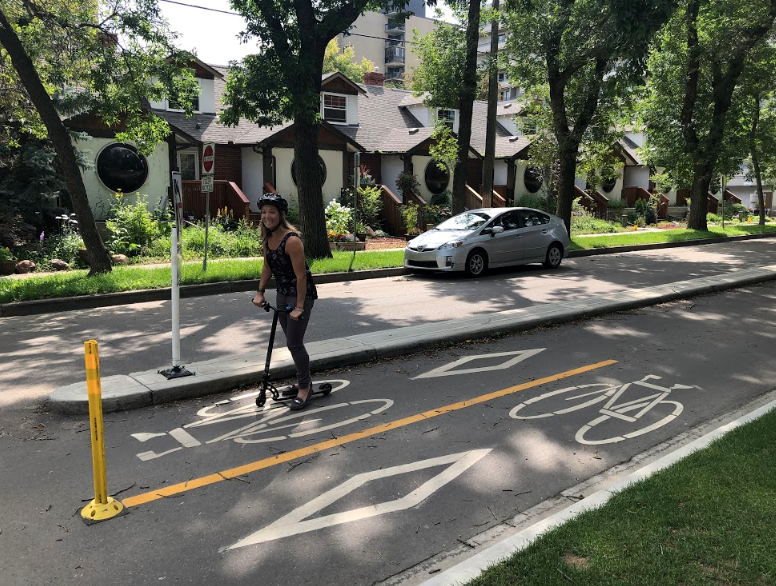Expect to see more e-scooters in bike lanes, on multi-use trails and in some city streets this summer.
The region is recommending a change to its traffic and parking bylaw that will allow the electric kick scooters in certain areas starting July 1.
Pending council approval, staff is also expected to put out a request for proposals to companies interested in setting up e-scooter rentals as soon as possible.
The move follows the Ministry of Transportation's (MTO) e-scooter pilot program, which asked the region to determine where the vehicles should be allowed and to develop rules for their use.
Although many private owners of e-scooters take to the trails in Waterloo region already, in most cases they're doing so illegally.
But starting this summer, they'll be able to ride without worry on multi-use trails, shared bike lanes and on roads where the speed limit is 50 km/h or less.
The new rules will require every rider, regardless of age, to wear a helmet at all times.
Other e-scooter provisions in the revised bylaw call for no sidewalk riding, speed etiquette for multi-use trails and paths, and parking restrictions.
The revised bylaw will allow enforcement on trails and city streets, with fines set out for anyone in contravention.
Waterloo was the first municipality in the region to work with e-scooter rental company Lime in a pilot project that ended in the summer of 2019.
Later that year, Lime decided not to renew the pilot along Waterloo's trails because legislation at the time prevented e-scooters on city streets and still does.
Then in January 2020, the province launched its e-scooter pilot program, inviting municipalities that want to allow e-scooters to determine best practices around their use and pass by-laws to permit them.
The region initiated a study in spring 2020, funded through the Federation of Canadian Municipalities’ Municipalities for Climate Innovation Program, to determine local interest in moving forward with an e-scooter plan.
The region conducted an online survey in January 2021 focused on bicycles, e-bikes and e-scooters to come up with a summary of best practices around their use, community access, and longevity for shared systems.
Overall, 67 per cent of survey participants were in favour of the region's plan to allow e-scooters on trails and city streets.
Survey participants from Cambridge, however, wanted to allow e-scooters on trails, multi-use paths and all roads with reserved bike lanes, but they were less in favour of adding roads with speed limits of 50 km/h or less.
Over the first few months of allowing e-scooters on streets, paths and trails, staff plan to monitor travel patterns, parking behaviours, collisions and injuries in collaboration with the region's traffic coordinating committee, Waterloo regional police, Public Health and emergency services.
The information will help staff determine the scope of any necessary modifications to the bylaw and could result in restricting e-scooters on specific corridors.
The region is not recommending any changes to the rules around e-bikes at this time since the province recently announced a reclassification for e-bikes that defines them as either bicycle-style, moped, or motorcycle-style as part of the 2021 Moving Ontarians More Safely (MOMS) Act.
The MTO says rules around the reclassification are under review and any changes outlined as part of the MOMS Act will not be implemented until a provincial announcement is made.
Currently, no type of e-bike is permitted on multi-use trails under the region's Traffic and Parking ByLaw, but the province permits all e-bikes under 120 kg on roadways to a maximum speed of 32 km/h.
The region says adding certain types of e-bikes into a shared micro-mobility system will require a separate public consultation program.



